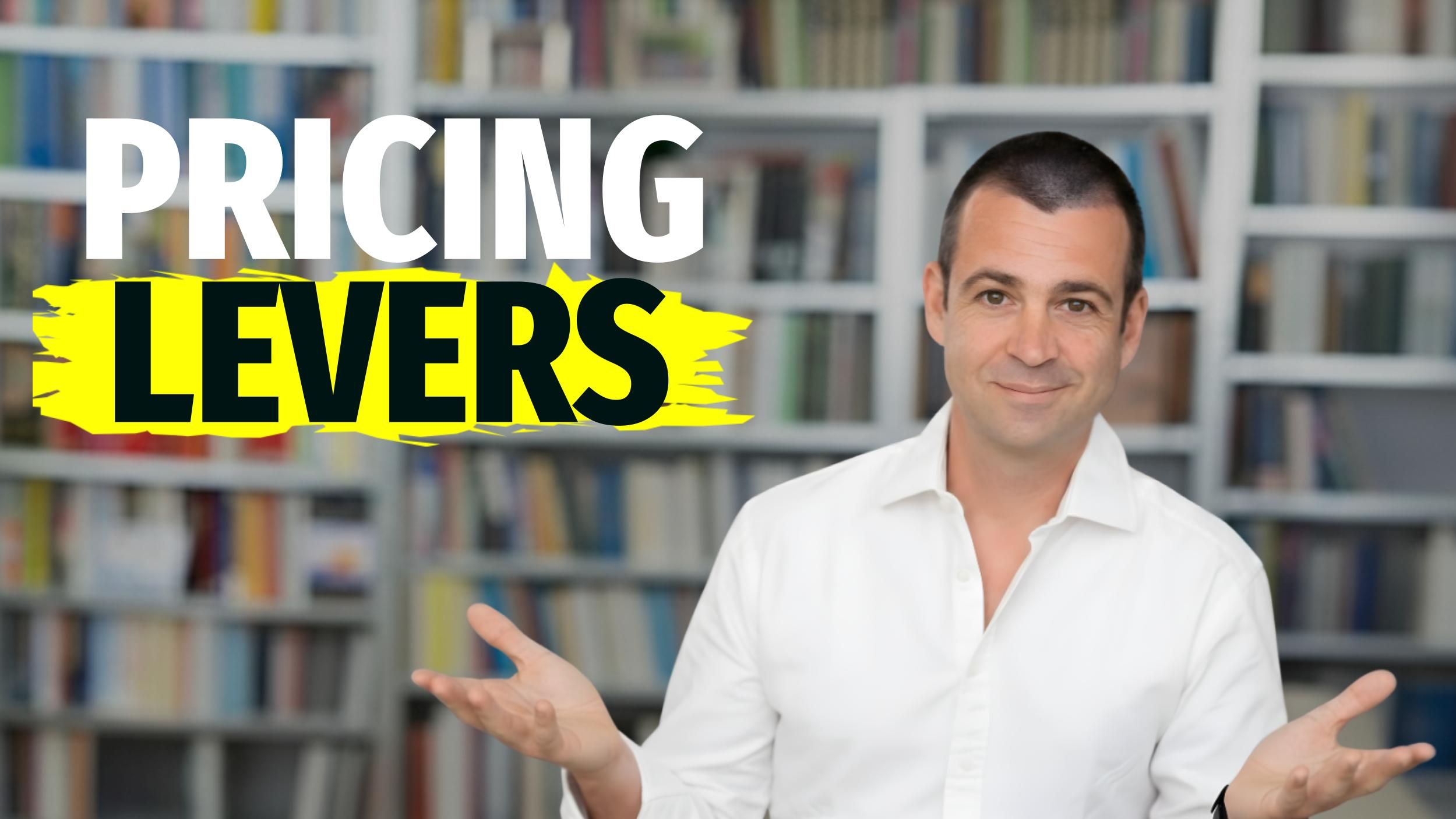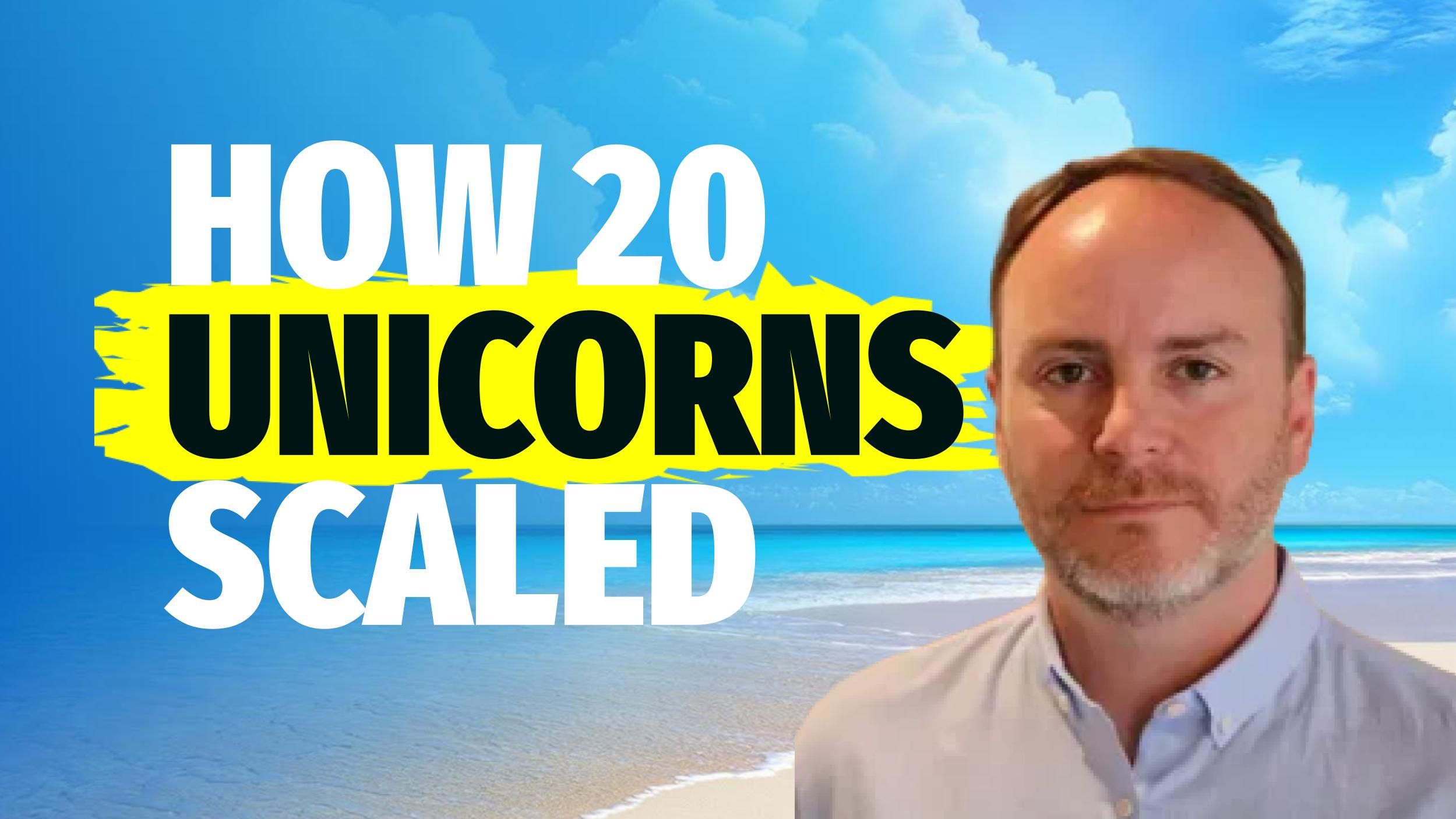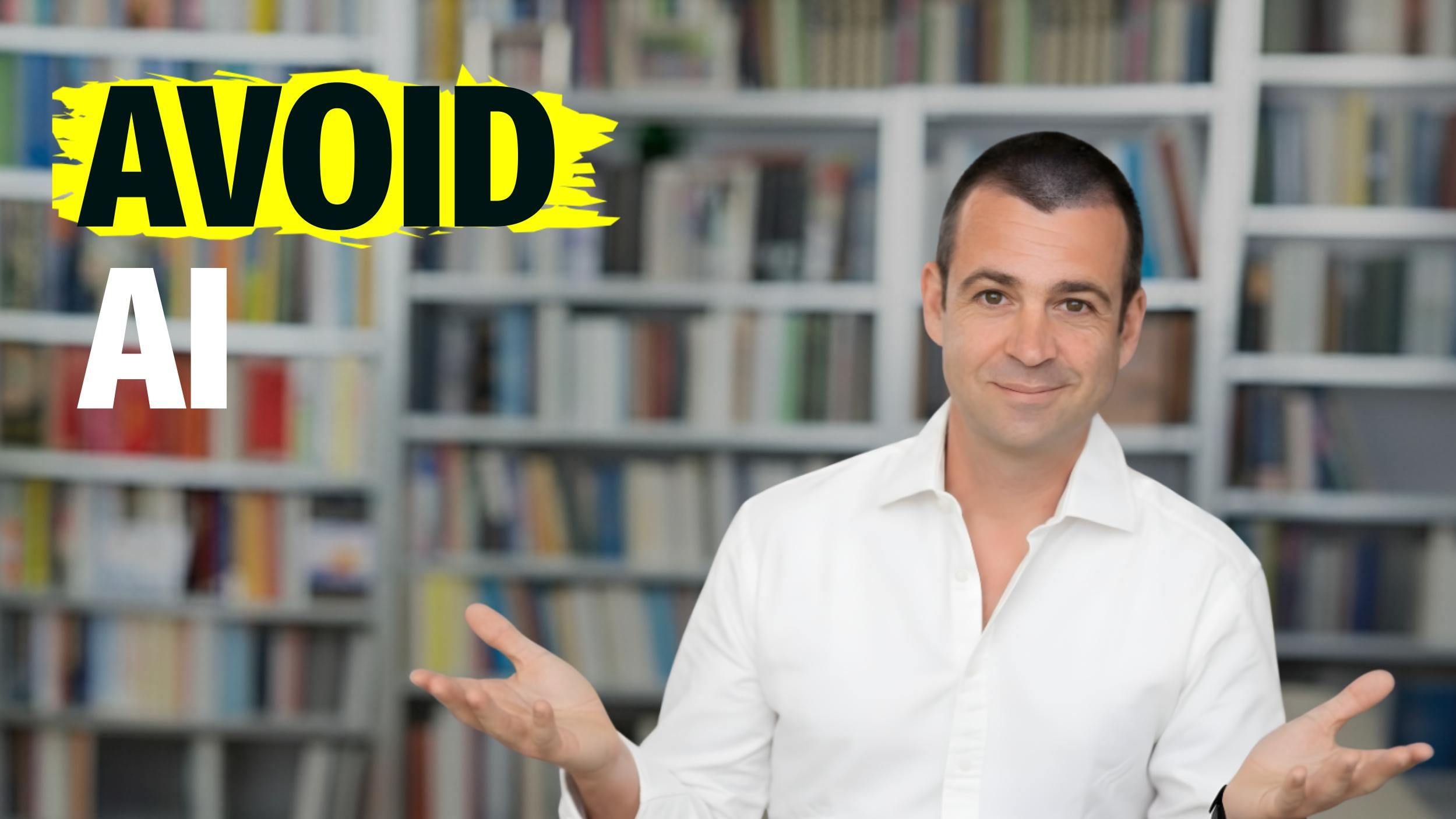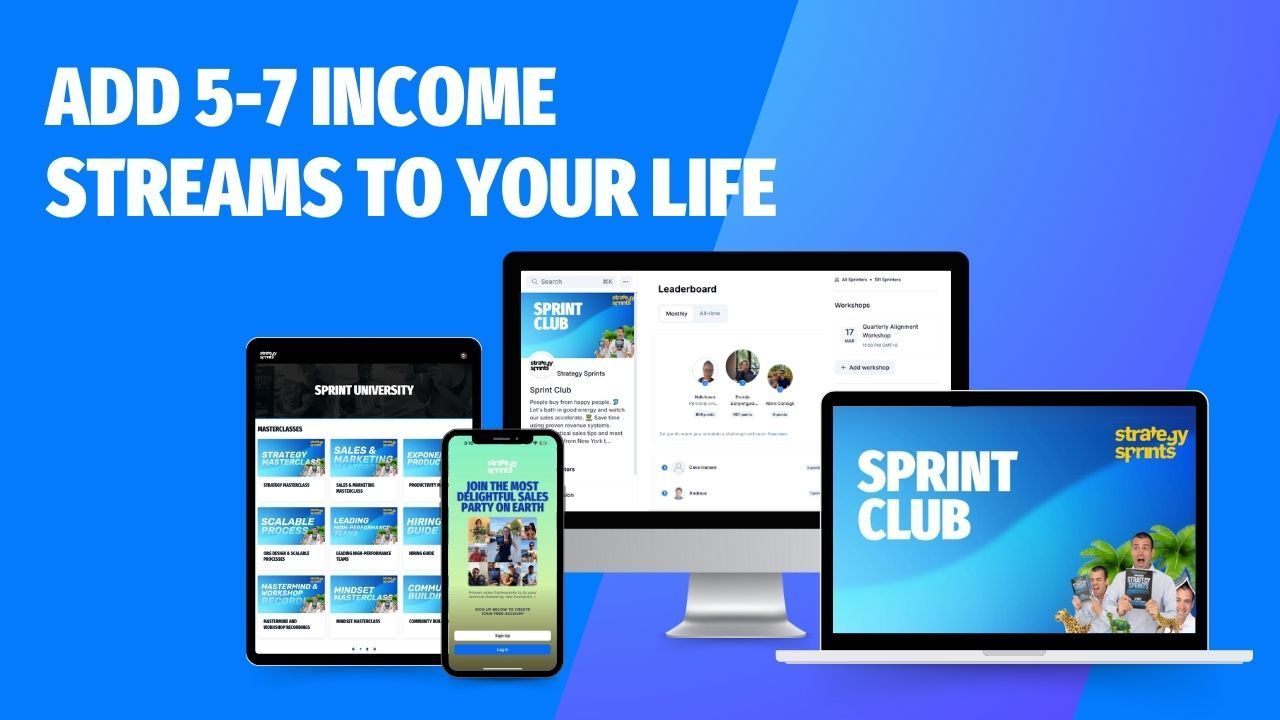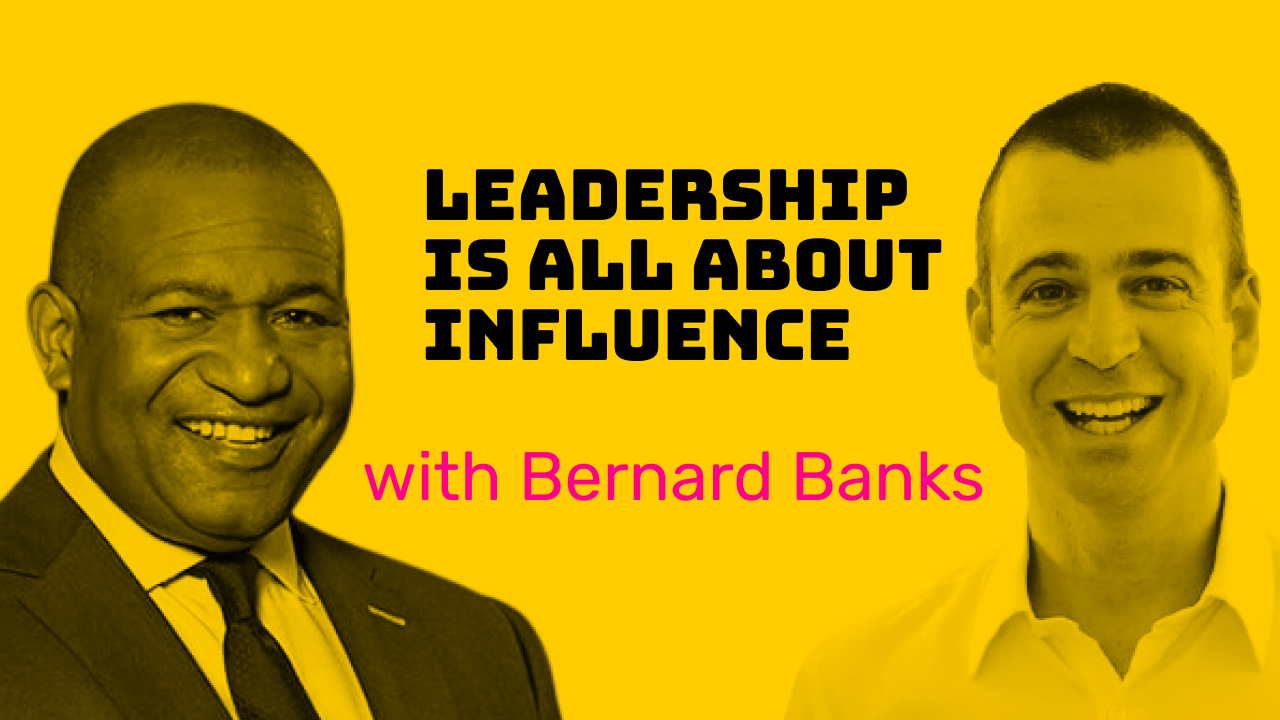
Leadership is All About Influence | Bernard Banks | STRATEGY SPRINTS 171
In this episode, Simon and Bernard Banks, the Associate Dean for Leadership Development and Inclusion at Northwestern University’s Kellogg school of management, will discuss about diversity in organizations and leadership and its influence. Bernard Banks is an expert in leadership and organizational change. Listen and learn how to become an effective leader.
Three valuable insights:
- If you don't create an inclusive environment, then you're not going to have the best talent, and you're not going to be able to compete in a highly dynamic environment.
- To become an effective leader, competence and character are two most important factors.
- Leadership is a process of influence, and influence is the heart of leadership. Leadership is accessible to everyone and we all have the opportunity to lead well on a daily basis, and influence is all about opening up another person's prospect to acting in a manner consistent with your desires.
Simon (00:15):
Welcome back everybody to the Strategy Sprints podcast. I'm your host, Simon Severino. And today my guest is the Associate Dean for Leadership Development and Inclusion at Northwestern University's Kellogg school of management. He has led the leadership department of Westpoint and has so much more experience. So all our leadership questions are in a very good place today. Welcome everybody, Bernard Banks.
Bernard (00:43):
Well, thank you very much. It's wonderful to be here today.
Simon (00:47):
Because leadership right now in the pandemic is relevant and touches everybody. And they, especially these audience, were leaders of their field and business owners of small and medium businesses worldwide, so we're super excited to deep dive the leadership conversations with you. We will see that leadership has to do with influence, we will see what makes an effective leader, and why accountability is so important and how we can ensure that.
But first Bernie, what are you currently up to?
Bernard (01:24):
Well, currently at Northwestern Kellogg, we are closing out the academic quarter. So we're on a quarter system as opposed to a semester system. So our students just finished exams. We're in the midst of grading. Everybody is about to go off for a few weeks. They'll come back in early January to resume their academic studies. But in terms of what I'm primarily focused on, I am thinking very intently about how this school continues to evolve in its efforts to develop the leadership capabilities of both our students and our broader community members, whether that's staff, faculty, or alumni. Additionally, I'm helping to think through how we integrate a focus on people, behaving inclusively and creating inclusive environments into our leader development efforts. So when we think about diversity equity and inclusion, it's not just a standalone thing. It has to be core to what an organization is doing from a strategic perspective. And as Kellogg thinks about the way ahead, we want to ensure that we are creating an environment where people are compelled to behave in an inclusive manner and to develop their acumen in creating inclusive cultures. And so I'm helping us to think through what are the activities that we integrate into that effort? What is the scholarship that informs that effort? What is the culture necessary to undergird that effort
Simon (03:03):
Love it. So you're thinking about on the governance level about diversity, equity and inclusion, and what do you see happening where people were emerging…? I would love to amplify to see more of that.
Bernard (03:25):
So when I think about what's going on in organizations right now, and I'll take this from the perspective of the United States, for example. You have many who are asking, will this be the moment where the conversation fundamentally shifts and we see organizations take their diversity equity and inclusion efforts to the next level. My response to that is we don't have enough data to suggest, yes, this is the moment. There is a lot of energy around this, but what we know to be true is that for those who say it's the right thing to do, it's always been the right thing to do; Yet, that has been insufficient to really drive organizational efforts related to this topic. So now organizations are asking, is it the smart thing to do? And I always highlight changing demographics as one of the reasons why this makes sense, in addition to taking a look at research that indicates organizations that leverage diversity more effectively, create better business outcomes.
Bernard (04:35):
But if we just go back to the changing demographics piece, currently in the world, there are approximately 7.7 billion people on the planet today. That number is expected to grow by 2 billion over the course of the next 30 years. So you'll go from 7.7 billion to 9.7 billion. 1 billion of the 2 billion and growth will come from only nine countries. And those countries are overwhelmingly experiencing growth amongst people of color. Population in Europe is expected to decrease; Population in Sub-Sahara Africa is expected to massively increase. So if you're seeing that there's a tremendous growth in the people of color on the planet, and that geographic mobility is going to remain fairly constant, but you have 2 billion more people that are in that pool of folks who are moving around the world in pursuit of professional activities. It stands to reason organizations are going to become more diverse.
Bernard (05:41):
And if your organization is going to become more diverse, or if you need to attract more diverse talent, because that's where the value lies in terms of being able to execute on your business objectives, meet customer needs, name your thing… If you don't create an inclusive environment, then you're not going to get access to the best talent; If you don't get access to the best talent, you're not going to be able to compete in a highly dynamic environment. And so it's the smart thing to do, to think intently about how can we create a more inclusive culture so that we can attract the talent. We need to address the complex challenges we'll face to seize the opportunities that matter to us, so that we can maintain our relevance in a world characterized by rapid change.
Simon (06:30):
Wow. And so when thinking of creating this system, what are you evaluating? Is it like more creating incentives for the people who do the right behavior, or is it more panelizing if it’s not happening, or is it a hybrid, or something completely different? So what are you…?
Bernard (06:55):
It's a great question. So the first thing to understand is you have to start with the end in mind. So when we say, what does it mean to be inclusive? Give people an understanding of what do you mean when you use that term? So there was research conducted by Deloitte that highlighted six attributes of inclusive leaders. And so making people cognizant of what those six attributes and behaviors are and the benefits associated with them, that's step one. So this is what it means to behave in an inclusive way. Then you have to ask yourself what kind of culture is necessary for somebody to display those behaviors and to accrue positive benefits as a result. But in order to have a culture that prizes these things, you have to have a strategy that requires you to leverage those things in service of creating the outcomes you desire, because strategy serves as the impetus for thinking about what kind of culture is necessary, so that we can honor the choices associated with the strategy.
Bernard (08:13):
Once you get to that point to say, okay, strategy and culture, inexorably linked, but culture exists to support the execution of strategy. Then you have to say, okay, in order to do this strategy well, what behaviors must our culture celebrate? And then how do we reinforce on a daily basis? People's willingness to either adhere to those behaviors or to highlight when their behaviors are not consistent with what we are electing to celebrate, to make our new normal, name your thing. So there's a concept called James Lange theory that says behavioral change, proceeds, attitudinal change, which means that an organization can't simply say from this point forward, we're going to celebrate diversity. That's just not the way human beings operate. Instead, you have to think about what behaviors are associated with an inclusive environment, mandate adherence to those behaviors through organizational standards.
Bernard (09:21):
When people behave in a way that's consistent with the standard, recognize that and celebrate it. When people don't behave in a way consistent with the standard, provide feedback, highlight the need to modify their behavior, and also let them understand what the consequences are associated with an unwillingness to modify their behavior, to meet organizational expectations and standards. As one starts to accrue positive benefits from adhering to the standards and behaviors over time, they come to adopt the belief associated with the behavior. And so behavior is the thing that organizations have to focus on because behavior can be observed, measured, and modified; Behavior can be rewarded, or it can be punished. And so the organizations that are serious about getting after this work, they are the ones that are going to really be clear about. Here are the behaviors we expect from our employees. Here's why those behaviors matter. Here's how we're going to hold you accountable for those behaviors. And here's what will transpire if you, for whatever reason, elect to not behave in a manner consistent with our expectations
Simon (10:35):
And what are some possibilities to trigger the conversations about these behaviors that everybody observes, and to make it a conversation that is ongoing, that starts with the small things. Instead of going back to where we wrote it down, and once a year, we will discuss it. So what can happen to make it an ongoing conversation?
Bernard (10:57):
It's great. You have to tie it to business objectives, organizational values, and what are the implications associated with not behaving a certain way, or what are the benefits associated with behaving a certain way? So, for example, if an organization says, we're going to seek to foster greater collaboration, and in order to collaborate effectively, these are the behaviors associated with that. But they see that somebody still has a propensity for going it on their own: They don't dialogue a lot with their peers; They don't solicit diverse perspectives; They don't value when people offer up a perspective that's different than their own. To have that conversation, you have to route it to here's how our business is being harmed by your unwillingness to engage in this behavior. Here's how your intransigence is not in keeping with a core belief that we are committed to reflecting inside our organization on a daily basis. Here's the harm that's being caused by your actions. And here's what's necessary to change it.
Bernard (12:04):
If in fact people believe that there's no downside to maintaining their current behavior, they'll do that. People are very simple in that way. They'll hold onto what they have if they don't perceive what's being offered up is better than what they currently possess. Until you believe deeply that changing what you're doing is going to result in better outcomes for you than maintaining what you currently do, you will hold onto what you currently do. And so organizations have to be serious about showing folks that if you elect to behave in a manner, that's inconsistent with our stated intent or the new behaviors we're trying to encourage everyone to adopt, then the maintaining of your current way of being is not going to result in your ability to be successful in the environment. That's why accountability is so important. If you don't hold people accountable, then nothing will change. And that's why accountability is more than simply what you say. It's what you measure. It's what's your reward. It's what you punish. Accountability matters. Always.
Simon (13:37):
This speaks a lot to me. I have started, but, basically, I have stopped saying “yes” to projects that are not regularly. And in my case, it's weekly measured and discussed. Because what I have seen is that you can have, you can collaborate with people, and then you say, these are the values. These are the rules, et cetera, but then nothing happens. So I have said to myself, you will limit the number of activities that you and you will do. Only the activities that are measured regularly, because they're, whatever you say is important, you will make sure it is discussed and it improves every week. So I really resonated a lot with that. And I am super curious, who you nominated for the strategy award, but first one word to our sponsors.
Simon (14:38):
So you can pick one person when everybody's thinks this person is zagging. But from your perspective, this person is doing the right thing. Who is this person?
Bernard (14:50):
Uh, strategy award. I probably would go with Satya Nadella at Microsoft. You know, in the time that he's taken over the organization, he has embarked on a journey to reposition Microsoft as an organization from basically being a product company to a learning company. They've moved off of, “Hey, we need to put a computer on every desk in the world” to this notion of, “we need to price, produce goods and services that allow people around the world to achieve their full potential.” And so he built a strategy around that. They have aligned a talent strategy to go with that, they've engaged in cultural modification to allow that strategy to be enacted properly, and the value that he's unlocked in Microsoft since 2014 has been explosive. So when I think about technology companies, especially large technology companies, the ability to pivot the company in that manner has been poorly, truly impressive.
Simon (16:08):
Absolutely. And what are the three books that influenced you most? It's hard for an academic, I know, but if you're able to pick the one that really shaped you the most.
Bernard (16:21):
Um, there's a book by Warren Bennis called On Becoming a Leader that helps you to understand the importance of seminal events in one's life and how that informs your behavior as a leader.
There's another book called, um, In Search of Meaning written by Victor Frankl, which helps me to understand that I'm in complete control of how I choose to respond to anything that despite what goes on around me, I have complete agency over my response.
I'd also say, you know, book number three, um, you know, like you said, there are many… The Leadership Challenge, by Kouzes and Posner is another one that I like the way in which they break down what leadership consists of and how one might go about amplifying their ability to lead effectively. So those are three that I routinely refer to in my work. Now obviously, if I think beyond the sphere of leadership, there are countless other things that I've read that experience the way I think, but in the field of leadership, those are three that always rise to the fore. You know, this understanding of what your crucible events are, this understanding of, how you take control for your response, this understanding of what are some of the things that effective leaders embody and how you can become better at doing those things
Simon (18:12):
Powerful. And maybe we deep dive directly there. What are the things that makes leaders effective, especially in this situation of high volatility and uncertainty?
Bernard (18:25):
Yeah. I mean, I really break it down into two things, competence and character. Do you possess the competence necessary to operate in whatever sphere that you perform your activities? Because competence is relative. The competence required to be an effective aerospace engineer is different than the competence required to be an effective truck driver. So competence always matters.
Simon (18:54):
I have my confidence. If I am a small business leader, my competence was very high before March, and now all the elements are changing. So how do we assess competence in this situation?
Bernard (19:09):
Uh, yes. Once again, competence is something you're always having to develop. And so for example, COVID happens, individual’s business models experienced tremendous pressure, and individual says we don't have a digital presence, but if we're to compete in a remote work environment, we have to rethink our business model, given the need to make sure it is digital. And so you now have to develop competence in one of those digital aspects of your business model. So competence is always something you have to continually be updating and it's contextual in nature. So you have to be competent. And the other thing is you have to have on a saleable character. So do you believe in a positive set of values and do you more importantly, manifest a commitment to behaving in a way consistent with those espoused values? And I think it's the combination of the two: competence and character, that allows somebody to be effective and to sustain the outcomes they're generating, because they're not doing it in a way that might allow you to do something short-term, but won't stand the test of time because you took shortcuts along the way. So to me, effective leadership is always about how do you foster the competence and character necessary, to do both short and long-term things you desire.
Simon (20:51):
I love the clarity of this definition. And at the same time, the fluidity, it is adaptive to everything out there that changes competence, as you define it is my willingness to be on top of the competence that I need to bring right now. So it's a learning, it's a learning aspect and the character and my integrity is also, um, how I react right now. Love it. So, on the other side, what did you recently change your mind about?
Bernard (21:31):
I don't know if I so much changed my mind in recent months, as I solidified my understanding of the importance of being agile and being people-centric. The agility piece, it's not the fact that you have to change what you're doing, it's are you willing to change what you're doing? And can you change it fast enough so that you can maintain your relevance? Some folks were just hoping COVID would go away. They didn't want to have to learn new things. So they were just holding on. They were doing things the way they had always done it, hoping that we'd get through this quickly. And they could just basically keep doing the things they were doing. And as they started to realize, no, this is not going away quickly, then they started to say, okay, now what changes are necessary? Agility matters always in a dynamic environment. Additionally, it's all about people. You manage things, you lead people. And so having to go to a remote work environment, people could spend all day long thinking about what the technology required for us to work remotely in an effective way, but it's more important to think about what are the demands being placed on our people by working remotely?
Simon (23:09):
Absolutely, where can people stay in touch with you read more about you? Are your courses even public or some of them?
Bernard (23:18):
So our courses were being taught in three modalities. So we have small courses that are still being taught physically. We have most courses that are being taught hybrid. So some folks will be in the classroom and some folks will actually be in their homes simultaneously. And we're working the dynamic between the two groups. And then we have some classes that are taught entirely remotely. And so we're using all three to provide people choice. There are some folks that are desirous of still being in class physically, and we want to make sure we provide them that opportunity, but also do it in a way that's safe. So we do that and we work through what's necessary to do that well, you also have the hybrid model, which creates greater flexibility. Then you have some that are like, nope, I just want to go all remote. So the nice thing is that we figured out a way to do all three and we are doing all of our courses and what we call synchronous, which means they are held at their normally scheduled time. It's always live.
Bernard (24:21):
We don't record classes and then let people just watch them later at their leisure. So we are keeping people on their normal schedule. We are providing flexibility to ensure that we're maintaining a safe environment for every one of our students, but at the same time, creating a world-class learning environment for everyone of our students. And we're constantly updating the technology. We're employing as part of our efforts to ensure that everybody has seamless connectively, because people are in a variety of locations all around the globe. Their access to broadband could differ significantly based on where they're at. And so we always want to make sure we've got them on the right platforms so they can have the right connectivity so they can take part in the right conversation so they can foster the right growth.
Simon (25:14):
Wow. Where can people stay in touch with you read more about you?
Bernard (25:19):
The easiest place to find me is on the Northwestern university website. So if you were to Google my name, Bernard Banks, Northwestern university, Kellogg school of management, my information pops up. It'll take you right to my faculty website link or to my LinkedIn account. But I'm pretty easy to find on the web.
Simon (25:46):
Who should be my next guest.
Bernard (25:49):
Oh, that, yeah, there are so many fascinating people in the world. I would not even hazard a guess on, you know, who should be your next guests? There are people that are widely known, but I always assert the most fascinating people are not the ones we see in the media every day. It's the people we encounter as we live our lives every day. And so I am not going to be so bold as to say, “Hey, you need to talk to this person.” I would simply say, as you go about your life on a daily basis, and you encounter people who are making positive differences in the world around them, think about bringing one of them on to say what informs, how they're choosing to behave and what ignites their passion for making a positive difference.
Bernard (26:43):
You know, if you ask somebody, tell me about great leader. Typically they'll go to great man, great woman statesman, and a business person, name your thing. Somebody who's achieved a lot of very public success. And my question to them is always, have you ever met that person? And almost invariably the answer is no. Now if I change the question to say, tell me about somebody who made a positive difference in your life, then you hear about teachers, parents, colleagues, you name it. And when you examine that person's activities, what you find is they engaged in outstanding leadership. And so leadership to me is not a role, one occupies. It's a way one is being in a formal position of authority, most certainly can aid in trying to influence those around you. But leadership is a process of influence. That's accessible to all of us and every single one of us has the opportunity to lead well on a daily basis. And so if somebody who is the same, you know, Bernard, tell me about an outstanding leader. I'd say, well, I want to tell you about my grandfather more so than I want to tell you about this chief executive officer or this general from the military, or they're all outstanding leaders as well, but if I think about who made a positive difference in my life, going back to my parents, going back to my grandparents, thinking about those teachers and coaches who influenced my development, that's where I go, initially.
Simon (28:09):
You brought up influence in a position to leadership, or in addition to leadership, what is your definition of influence? How can one observe it understandably.
Bernard (28:18):
Yeah. Influence is all about opening up another person's prospect to acting in a manner consistent with your desires. You know, influence is about moving somebody from one place to another. And when you take a look at the definitions of leadership, there's never been a single definition that says must be in charge, not one. So influence is the heart of leadership. How do you move people from one place to another to achieve mutually beneficial outcomes? And in order to influence well, we have a number of tools at our disposal, but it's also highly correlated with the extent to which you are trusted by that person. So to become a more effective leader, you should always be asking yourself, how do I increase the amount of trust people accord me, and how do I leverage that trust to become more influential.
Simon (29:29):
Beautiful. Thank you so much, Bernard, for being on the show and sharing your wisdom and knowledge and your journey with all of us, please come back soon!
Bernard (29:40):
Absolutely. Thank you so much. I've enjoyed it.
Simon (29:43):
Bye bye.
Get our expert sales tips delivered
By submitting you agree to receive our weekly Strategy Sprints Newsletter as well as other promotional emails from Strategy Sprints. You may withdraw your consent at any time via the “Unsubscribe” link in any email or view our privacy policy at ant time.


